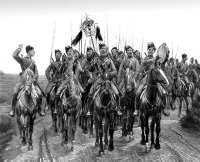 In the midst of a most improbable family reunion back in November, the name of Union General John Turchin (shown right) came up.
In the midst of a most improbable family reunion back in November, the name of Union General John Turchin (shown right) came up.My father's cousin Basil Rotoff, in from Canada, said that Turchin was a member of our Host, the Don Cossacks, and that there was a full biography of the man written in Russian. Uncle Basil put in a few good words for the hard war Turchin practiced, and in a room full of Cossacks, there was ready agreement.
I kept my own McClellanist mouth occupied with champagne and oysters, as it were.
Uncle Basil pointed out that Turchin was the commanding officer of one of the Czar's imperial Don Cossack guards regiments. This would certainly have made him an acquaintance of our own kith and kin, I think, for they served in the same capacity long before his time and after.
Guards officers were members of the court. They were not cavalry militia scraping out a life on the frontier subject to retaliatory passions. This makes Turchin an odd duck, for he was both a revolutionary, Basil told me, and a sexual libertine
 given to mistresses. Turchin was also - as any Civil War reader knows - a scorched earth general.
given to mistresses. Turchin was also - as any Civil War reader knows - a scorched earth general.Moten tells us that when McClellan was in the Crimea, the French wanted nothing to do with him; the British were congenial but suspicious; but the Russians welcomed him wholeheartedly. This could have engendered that Russophilism Moten notes in GBM.
Taken into the bosom of the Russian army, McClellan concluded that Cossacks were a paradigm for a kind of frontier cavalry that could be repurposed for conventional war. A surmise: he did not get these ideas by associating with line officers, the kind who might have burned Athens, Georgia, in a trice. He spent time with the court's polished Guard Cossacks (right), who would have shown more "soft war" in their French conversation (French being a language of the court and McClellan being a French reader and speaker). The question arises as to whether McClellan might have associated hard war with an American-model Cossack-style cavalry. On the frontier, perhaps, but in conventional war?
I have good reason to suspect that hard war John Turchin met soft war George McClellan in the Crimea, not that either was advocating for a particular policy at that time. Turchin's Don Cossack Guard regiment was there - my own family history tells us so. Also interesting, is this item of information:
In 1856, at the end of the Crimean War, the Turchins immigrated to Chicago, Illinois, where he found work in the engineering department of the Illinois Central Railroad.The chief engineer in that department was one George B. McClellan. Had McClellan's draft cavalry regulations, submitted to Secretary of War Jefferson Davis as appendices to his Delafield report, owed anything to John Turchin? In other words, did Turchin impose upon a friendship?
Recall also that the railroad's lawyer was one Abraham Lincoln, and Mr. Lincoln's boss was the same George B. McClellan. As often as Lincoln and McClellan toured the Illinois county courthouse circuit together on land cases - a subject Civil War history has yet to show the slightest interest in - the question arises as to whether Turchin might have stood in for his boss McClellan now and again.*
One wonders if a Lincoln connection prompted Illinois' Gov. Yates to give Turchin his state USV colonelcy in 1861. These were highly prized political posts. Most foreign officers with military experience lacked connections; the governors rejected them and they ended up on the staffs of Fremont or McClellan. Turchin got a regiment from Yates. Then he got a brigade from Mac's protege Buell.
There is enough Turchin literature about in English such that we, as readers, might get insight into the Turchin-McClellan-Lincoln connections without waiting for various Pulitzer winners to show us the light.
Notice that...
* The Illinois State Historical Society has some useful articles in print (scroll way down).
* The Army has archived a 100-page plus study of the general.
* There is a new book on the sack of Athens due out next month.
* An older book focuses on Turchin's abolitionism.
Amazon also lists a couple of old books by Turchin himself.
***
P.S. Later, when McClellan moved on to assume the presidency of an Ohio railroad, and when he vacated that presidency to prosecute a war, he was replaced by a certain Nathaniel Banks. But that is another post entirely.
P.P.S. "John Turchin" is an idiosyncratically Americanized name. I find it weird that there could be an actor and a developer of the same name at large today. In fact, there a lot of John Turchins out there.



